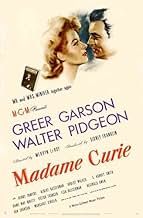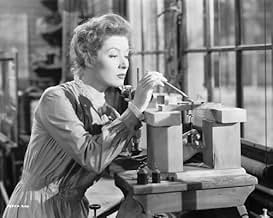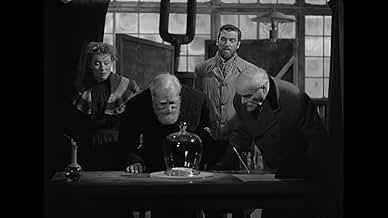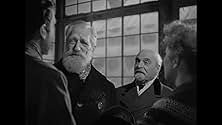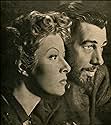A pesar de ello, el físico consumado y soltero declarado Pierre Curie se enamora de la brillante estudiante Marie, y juntos se embarcan en el descubrimiento del radio.A pesar de ello, el físico consumado y soltero declarado Pierre Curie se enamora de la brillante estudiante Marie, y juntos se embarcan en el descubrimiento del radio.A pesar de ello, el físico consumado y soltero declarado Pierre Curie se enamora de la brillante estudiante Marie, y juntos se embarcan en el descubrimiento del radio.
- Dirección
- Guionistas
- Elenco
- Nominado a 7 premios Óscar
- 3 premios ganados y 7 nominaciones en total
- Madame Eugene Curie
- (as Dame May Whitty)
- Tall Woman
- (sin créditos)
- Man at Accident
- (sin créditos)
- Swedish Queen
- (sin créditos)
- Lecturer
- (voz)
- (sin créditos)
- Professor
- (sin créditos)
Opiniones destacadas
The first third of the film is in many ways the best: a very funny and sensitive depiction of the courtship of two gauche scientists. Often filmed in long-shot on beautifully detailed, cavernous sets, we see Garson and Pigeon sometimes isolated in space, sometimes haltingly moving through crowds, tentatively finding their way to each other. Though Mervyn Leroy could be a stolid director, here he shows great delicacy and judgment and he perfectly sets a mood of gentle comic romance.
The middle third deals with the engrossing scientific mystery that led to the discovery of radium. The lightness of touch and the humor of the first third are not entirely abandoned here, but there is a greater seriousness and a kind of reverence for knowledge and scientific endeavor that is virtually absent from films today (the exception would be A BEAUTIFUL MIND, which I kind of hated). There are some striking visuals, including a tracking shot across hundreds of bowls of evaporating chemicals and a haunting image of a glowing dish of radium in a large, dark shed.
The last third is the dullest and most conventional portion of the film: fame and celebration for the Curies and a renewal of their love just before Pierre died prematurely in a traffic accident. The high point here is what surely won Pigeon his Oscar nomination for Best Actor: the speech to a jeweler in which he describes the beauty of his wife just before his untimely death. There is also the evocative image of a wet umbrella broken under a wagon wheel.
Of course, what you think of this idealistic, creamy and sure-footed vehicle (which must have packed 'em in at Radio City Music Hall) depends entirely on what you think of Greer Garson, as well as your opinion of the popular Garson-Pigeon screen team. Their looks and personalities were perfect matches, templates of feminine and masculine 'virtues'. There was nothing sexy about them but they suggested a platonic ideal of what every child would wish their parents to be. They were the last stars to make middle age look glamorous and desirable.
As for me, I like her. Her mannerisms are kept to a minimum in this restrained performance. The famous tinkling laugh, the arched eyebrow, the flaring nostrils -- so overused in some other films -- are not much in evidence here. But her best qualities are: the sense of intelligence, of quiet watchfulness, self-possession, dignity and tact are all here. The source of her screen personality has always seemed sane and tranquil, relaxing to watch and finally, to me, admirable. I can understand why some people (like critic Pauline Kael) felt that Hollywood's ladylike stars presented an outdated, oppressive ideal for women. But from this distance, Garson's confidence and ease, her capability, her self-containment all strike me as civilized and even sophisticated traits. She played grownups, and we have never had enough of those on screen . . .
Their long work in the laboratories finally leads to the discovery of radium--and this is the fascinating story of how they met and married and indulged in their lifelong pursuit of discovery. A young and rather miscast Robert Walker plays a fellow lab worker. Van Johnson has a few brief moments toward the end, as does Margaret O'Brien. But the focus is on Greer Garson and Walter Pidgeon and they both deliver Oscar nominated performances.
This is one of the better screen biographies and one that has been sorely neglected over the years. Watch for my career article on GREER GARSON to appear in an upcoming issue of FILMS OF THE GOLDEN AGE.
Based upon Eve Curies book, this film follows along pretty factually the Marie Curie story leading to the couples isolating of Radium in their lab after 4 years of work. The film concentrates on the relationship that forms between Pierre & Marie & the science. The script actually allows for a nice balance there.
Greer Garson is great as Madame Marie Currie. I can't see many other actresses doing as was as she does in this role. Walter Pidgeon is excellent as Pierre & it is these 2 leads that make the film a good one. There is some quick supporting work from Van Johnson but nothing about his cameo really does a lot for this particular film.
This film does show the MGM studio quality as it existed in the 1940's as it goes over very well & is well produced. MGM came into World War 2 as the premiere studio & this film was a strong entry in the biographical film category. It is very obvious that even though the film is set in France near Paris, that Paris was not available for location filming due to the war.
This is a very good film for it's era, being factually based & really painting a positive portrait of who Marie & Pierre Curie were & why they were important in the history of science. It does give short shrift to the couples kids but at over 2 hours the film has too much to cover to do otherwise.
¿Sabías que…?
- TriviaOnly one scene in the entire film--a long shot of the Curies on honeymoon--was actually filmed outside of the studio, and even that was second unit.
- ErroresWhen Marie determines chemical composition of pitchblende, 7 minerals add to 99%, one mineral (magnesium oxide) is .99% and the "extraneous matter" of .001% all adds up to 99.991%. Presumably the mag-Ox should be .999%, otherwise, the actual extraneous matter would be 10 times greater (.01%) than Marie's stated measurement.
- Citas
[last lines]
[Madame Curie addresses a large gathering of scientists]
Marie Curie: Even now, after twenty-five years of intensive research, we feel there is a great deal still to be done. We have made many discoveries. Pierre Curie and the suggestions we have found in his notes, and his thoughts he expressed to me have helped to guide us to them. But no one of us can do much. Yet, each of us, perhaps, can catch some gleam of knowledge which, modest and insufficient of itself, may add to man's dream of truth. It is by these small candles in our darkness that we see before us, little by little, the dim outline of that great plan that shapes the universe. And I am among those who think that for this reason, science has great beauty and, with its great spiritual strength, will in time cleanse this world of its evils, its ignorance, its poverty, diseases, wars, and heartaches. Look for the clear light of truth. Look for unknown, new roads. Even when man's sight is keener far than now, divine wonder will never fail him. Every age has its own dreams. Leave, then, the dreams of yesterday. Youth, take the torch of knowledge and build the palace of the future.
- ConexionesFeatured in AFI's 100 Years... 100 Cheers: America's Most Inspiring Movies (2006)
- Bandas sonorasTwinkle, Twinkle, Little Star
(uncredited)
from the French melody "Ah ! vous dirai-je, Maman" (music first published 1761)
Played on piano by Linda Lee Gates and Marie Louise Gates
Selecciones populares
- How long is Madame Curie?Con tecnología de Alexa
Detalles
- Fecha de lanzamiento
- País de origen
- Idioma
- También se conoce como
- Madam Curie
- Locaciones de filmación
- Productora
- Ver más créditos de la compañía en IMDbPro
- Tiempo de ejecución2 horas 4 minutos
- Color
- Relación de aspecto
- 1.37 : 1
Contribuir a esta página



